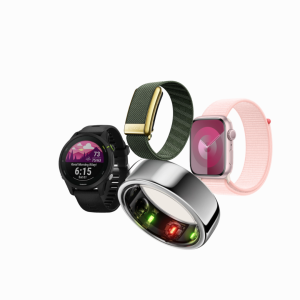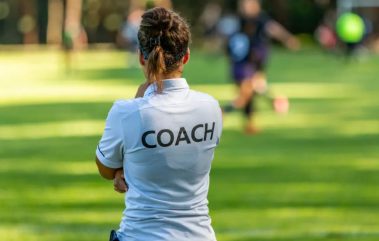FemTech (female technology) has revolutionized how women track, understand, and optimize their health and performance, especially in sports. This blog explores the role of various FemTech devices in exercise physiology, training, and performance. We will examine the pros and cons of each device, the sensors they use, and their practical applications in sports settings, particularly for the Indian sports community.
Understanding FemTech Sensors
Most FemTech devices use a combination of sensors to monitor physiological data, which is then processed by algorithms to estimate calorie expenditure and activity levels. Key sensors include:
- Photoplethysmography (PPG): Measures blood volume changes for heart rate monitoring.
- Accelerometers: Detect changes in motion to track steps, movement, and exercise intensity.
- Gyroscopes: Measure angular velocity and orientation for data on body movements.
- Temperature Sensors: Monitor body temperature to track ovulation and detect illness.
- GPS Sensors: Provide accurate data on distance and speed for outdoor activities.
Sensors and Their Functions
- Accelerometers: These sensors detect movement and acceleration, providing data on steps taken, distance covered, and intensity of physical activities like running or cycling.
- Heart Rate Monitors: Optical sensors measure heart rate continuously, offering insights into exercise intensity and calorie burn. This data is vital for optimizing training sessions and monitoring overall cardiovascular health.
- GPS Sensors: Integrated in some devices, GPS sensors track outdoor activities by measuring distance, speed, and route taken. This feature is beneficial for activities like jogging, hiking, or cycling.
- Temperature Sensors: Some devices, like the Oura Ring, use temperature sensors to monitor skin temperature, which can reflect changes in metabolic rate and overall health status. This information is particularly useful for understanding variations in body condition and recovery patterns.
Providing Personalized Health Insights
FemTech devices combine sensor data with powerful algorithms to generate personalized insights:
- Calorie Expenditure: Estimate calorie burn by analyzing movement patterns and heart rate data.
- Exercise Optimization: Real-time feedback on heart rate zones and activity intensity for efficient training.
- Recovery Monitoring: Insights into heart rate variability (HRV) and sleep quality to assess recovery status.
Application in Sports and Fitness
For female athletes, these devices are invaluable tools for:
- Training Optimization: Tracking performance metrics like speed, endurance, and recovery time.
- Health Monitoring: Continuous monitoring of vital signs for early detection of health issues.
Devices Overview

WHOOP Band
- Pros: Comprehensive health tracking, strain coach, long battery life.
- Cons: Subscription model, no display.
- Sensors: PPG, accelerometer.
Oura Ring
- Pros: Comprehensive sleep tracking, discreet design, temperature sensor.
- Cons: Unsuitable for some sports, shorter battery life.
- Sensors: Infrared PPG, body temperature sensor, 3D accelerometer.
Apple Watch
- Pros: Versatile health tracking, user-friendly interface, app integration.
- Cons: Short battery life, higher cost.
- Sensors: Optical heart sensor, ECG, accelerometer, gyroscope, barometric altimeter.
Garmin Smartwatches
- Pros: Advanced fitness metrics, long battery life, durability.
- Cons: Complex interface, higher cost.
- Sensors: Elevate™ wrist heart rate monitor, GPS/GLONASS/Galileo, pulse ox sensor.
Fitbit
- Pros: User-friendly, affordable, comprehensive tracking.
- Cons: Limited advanced features, variable battery life.
- Sensors: Optical heart rate monitor, 3-axis accelerometer, SpO2 sensor.
Polar Vantage V2
- Pros: Advanced training features, durable design, and long battery life.
- Cons: Complex interface, higher cost.
- Sensors: Precision Prime™ sensor fusion technology, GPS, barometer.
Indian Brands
Ultrahuman Ring
- Pros: Comprehensive health insights, discreet and comfortable, metabolic performance tracking.
- Cons: Limited for some sports, shorter battery life.
- Sensors: PPG sensor, temperature sensor, accelerometer.
GOQii Smart Vital Watch
- Pros: Comprehensive health monitoring, affordable, personalized coaching.
- Cons: Limited advanced features, variable battery life.
- Sensors: Optical heart rate monitor, SpO2 sensor, 3-axis accelerometer.
Continuous Glucose Monitors
Ultrahuman CGM
- Pros: Real-time glucose monitoring, metabolic health tracking, data integration.
- Cons: Invasive, subscription cost.
- Sensors: Glucose sensor.
Sports-Specific Menstrual Tracking Apps
Wild AI
- Features: Personalized insights, training adjustments, and nutrition tips.
FITRR Woman
- Features: Cycle tracking, performance metrics, training recommendations.
Natural Cycles
- FDA Approval and Use in Sports: Uses basal body temperature and menstrual cycle data for hormone-free contraceptive and menstrual cycle management.
Data Visualization and Integration
FemTech devices provide easy-to-understand data visualization, helping athletes and coaches make informed decisions about training and performance. Key features include performance dashboards, training recommendations, and coach integration.

Conclusion
FemTech devices offer powerful tools for female athletes to monitor and optimize their health and performance. From tracking menstrual cycles and metabolic health to providing personalized training insights, these technologies empower women to take control of their health journeys. Whether using the advanced metrics of WHOOP, the discreet Oura Ring, or the comprehensive Garmin smartwatches, there’s a FemTech device tailored to enhance your athletic performance and overall well-being.
References
- WHOOP. (n.d.). Retrieved from WHOOP
- Oura. (n.d.). Retrieved from Oura Ring
- Apple Inc. (n.d.). Retrieved from Apple Watch
- Garmin. (n.d.). Retrieved from Garmin Smartwatches
- Fitbit. (n.d.). Retrieved from Fitbit
- Polar. (n.d.). Retrieved from Polar Vantage V2
- Ultrahuman. (n.d.). Retrieved from Ultrahuman
- GOQii. (n.d.). Retrieved from GOQii Smart Vital Watch
- Wild AI. (n.d.). Retrieved from Wild AI
- FITRR Woman. (n.d.). Retrieved from FITRR Woman
- Natural Cycles. (n.d.). Retrieved from Natural Cycles
Author – Manasi Satalkar, Simply Periods Initiative, Simply Sport Foundation




